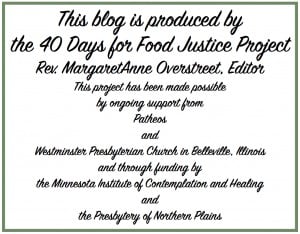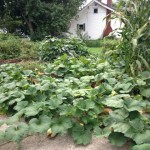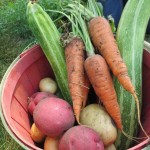“Everything that slows us down and forces patience, everything that sets us back into the slow circles of nature, is a help. Gardening is an instrument of grace.” – May Sarton
This week, we have revisited a few of the 2014 posts that are related to gardening. (You can read them here and here and here.)
But what does gardening have to do with food justice?
Every day – several times a day – we are given the option of making food choices that will do justice to our bodies, to our sisters and brothers (around the corner or around the world), and to all creation.
When we see the amount of resources that goes into providing produce for the U.S. during the winter months …
Or when the United Nations suggests that small-scale farming is the way forward …
Or when multiple sources suggest that improving the quality of the soil really might save the planet …
… it seems more and more apparent that growing food – whether in a few containers on your patio or your own plot in a community garden – is a responsible and justice-promoting activity.
There is still snow on the ground, but it is already time to begin preparing for this year’s garden. My local community garden has begun accepting applications and assigning garden plots as we gear up for the season ahead. Just in case you’re not yet convinced that gardening is for you, here are 10 reasons to get involved in a community garden:
1. Community Gardens connect people across generational and cultural lines.
2. Community Gardens offer exercise and fresh air to gardeners.
3. Community Gardens help people save money on food.
4. Community Gardens provide nutritious and delicious food.
Community Gardens mean food grown locally, without the industrial agricultural practices. In other words,
5. they dramatically reduce the resources required to move food from farm to plate,
6. they cut fossil fuels by opting out of the petroleum-based fertilizers,
7. they keep chemicals off the dinner table,
8. they do not erode the soil,
9. and they protect the groundwater and the watershed from contamination.
10. Community Gardens offer biodiversity by hosting different varieties of lettuces, tomatoes and other produce.
(Bonus) 11. Community Gardens are beautiful.
———————————-
Lenten Calendar for MARCH 7
Plan a meal today with friends; invite your guests to share stories at the table.
————————————
Sign up to receive the daily meditations by email, or like us on Facebook.
We need your stories!
We’re already looking ahead to the 40 Days for Food Justice Project for 2016 and we’re looking for more stories, experiences, prayers and resources about food justice and food injustice.
If you would like to contribute – or would like to recommend a contributor – please send us an email and let us know.
About:
In addition to being the founder and editor-in-chief of the “40 Days for Food Justice Project”, the Rev. MargaretAnne Overstreet is a mom, a Presbyterian pastor, and a certified Health Coach. She does ministry with and among the good people of Westminster Presbyterian Church in Belleville, Illinois, where she gets her hands dirty in the community garden and, every Sunday, preaches with bare feet. She treasures family time, relishes every opportunity to teach and write about food justice, and loves to play outside with her dogs. Find out more about her at www.AnInBetweenPlace.com












